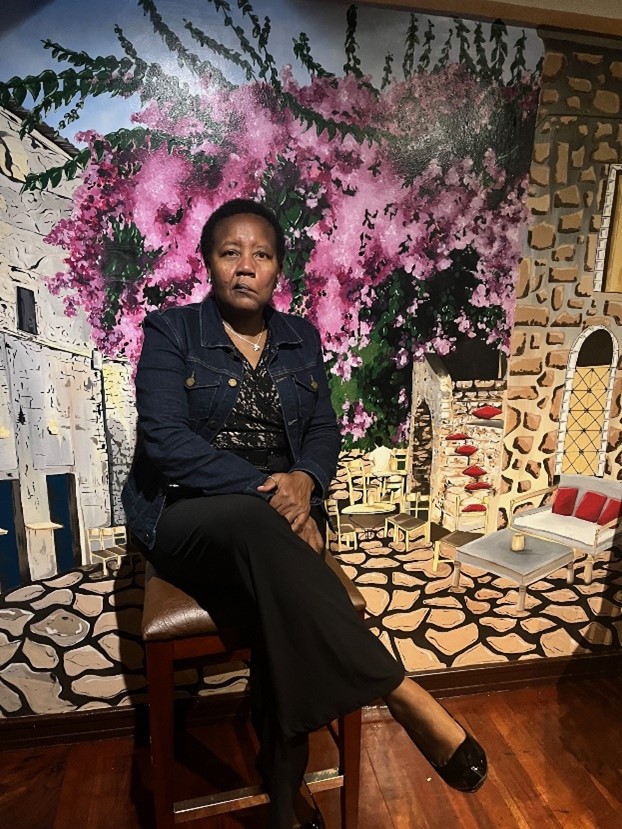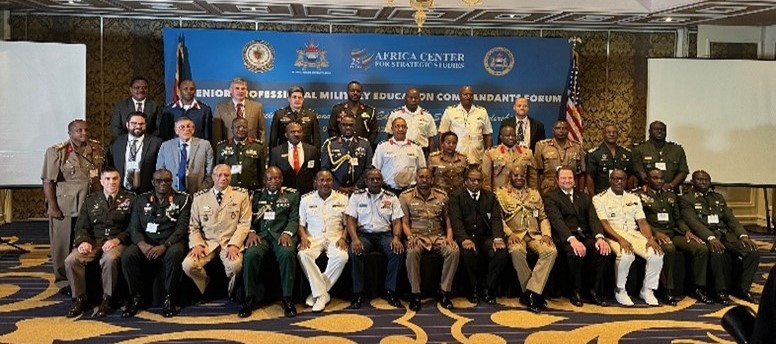English | Français | Português
 Since 2014, when she was a rising Lieutenant Colonel, Brigadier Joyce Chelan’gat Sitienei has been a part of the Africa Center community. Since then, Brigadier Sitienei has served as a panelist, facilitator, and participant in various Africa Center programs, including those focused on peacekeeping operations, gender and security, parliamentary engagement, emerging security sector leaders, and more recently, senior professional military education.
Since 2014, when she was a rising Lieutenant Colonel, Brigadier Joyce Chelan’gat Sitienei has been a part of the Africa Center community. Since then, Brigadier Sitienei has served as a panelist, facilitator, and participant in various Africa Center programs, including those focused on peacekeeping operations, gender and security, parliamentary engagement, emerging security sector leaders, and more recently, senior professional military education.
Please introduce yourself.
Brigadier Joyce Sitienei (JS): I am Brig Joyce Sitienei, currently Director of the International Peace Support Training Centre (IPSTC). I am an education officer in the Kenya Defence Forces (KDF) holding a Master of Arts degree in International Studies from the University of Nairobi, a Post graduate Diploma in Peace and Conflict Studies from the Africa Nazarene University, and a Bachelor of Education degree from Kenyatta University.
Over the years I have acquired extensive experience in training in instructional methodology and adult education techniques and accumulated wide knowledge and practice in curriculum design.
I have great interest in gender issues and as a result participated in gender training all over Africa on behalf of the IPSTC. This had led to my active participation in the Ministry of Defence/KDF and the IPSTC gender mainstreaming processes, including undertaking gender needs assessment and gender policy formulation. I continue to facilitate training workshops and courses imparting practical gender mainstreaming skills and knowledge in support of the institutionalization of gender at IPSTC and the Kenya Defence Forces.
I am a recipient of various decorations including Moran of the Order of the Burning Spear (MBS), United Nations and other Constitutional medals earned in service of my country. In recognition of my contribution to women’s peace and security, I received the 2024 Kenya Trailblazer Award. As director of the IPSTC, I am the incumbent president of the International Association of Peacekeeping Training Centres (IAPTC).
What are some of your recent interactions with the Africa Center for Strategic Studies?
JS: One recent interaction with the Africa Center was in July 2023, when the Center invited me to speak during a workshop on Advancing Military Professionalism Through Professional Military Education. I made a presentation on Adult Learning: Andragogy and Professional Military Education. Since then I have participated as a speaker in four other Africa Center fora: the Southern Africa Parliamentarians Forum in November 2023, where I spoke on the theme of Strengthening Relationships Between Parliament and the Security Sector; the Force Commanders’ Roundtable in January 2024, where I addressed Comparative Advantage, Coordination, and Convergence in African Peace Operations; the Emerging Security Sector Leaders Seminar held in June 2024, where I spoke on Critical Thinking to Enhance Professionalism in Africa’s Security Sector; and most recently, the Senior Professional Military Education Commandants Forum held in Nairobi, Kenya in August 2024, where I spoke on Gender and Professional Military Education.
To you, what does it mean to be an Africa Center Alumna?
JS: As an Alumna of the Africa Center, one is able to remain active in a network of current and former peace and security experts and practitioners from across the globe and more specifically Africa. It provides an opportunity to share knowledge and experiences that go towards enriching discourse in the field of security.
Did you make any special connections at Africa Center programs that you wouldn’t have otherwise made?
JS: Yes, quite a number. Most interesting was my interactions with the Southern Africa Parliamentarians and former United Nations and African Union Peacekeeping Force Commanders.
 Are you still in touch with alumni that you met through an Africa Center event?
Are you still in touch with alumni that you met through an Africa Center event?
JS: I still communicate with a number of them and have even invited some to the International Peace Support Training Centre as resource persons.
How have you seen responses to security challenges change over the past 25 years?
JS: Africa has had a lot of security challenges in the last 25 years including, but not limed to, transnational organized crimes like trafficking of humans, drugs, and proliferation of weapons; growing youth crisis; mass migration of peoples; disputes over land, water and other natural resources; militarism, piracy, and terrorism; environmental degradation; marginalization; religious extremism; military insecurity and violent conflicts; millions of displaced people.
All these challenges have occasioned a paradigm shift in the way security is viewed and responded to. The concept of security has shifted from one of state security to human security. Strategic leaders are now more conscious of the fact that conflict is no longer about securing borders and maintaining sovereignty of states but more about human security. It is clear that Nations cannot be secure if their people are not secure. In the presence of inequality and discrimination, violence, poverty, lack of education, lack of economic opportunity, political oppression, and other destabilizing factors, there is a high likelihood of conflict occurring. This has expanded the actors involved in resolving conflict to include communities, non-state actors, and even civil society. The security sector has had to work with all these actors to secure sustainable peace. There is growing appreciation that multifaceted and multidimensional responses must be employed to address social economic and political wellbeing of citizens and the state as a foundation to peace and security.
How do you anticipate African security challenges changing over the coming 25 years?
JS: The future looks bright for Africa. Despite the many problems Africa currently faces, the continent has great potential. Africa is positioning itself as an important global player and becoming more vocal in international affairs. The young urban population is increasingly putting governments to task to ensure good governance and accountability are realized. Africa through the African Union is taking several measures to bring African states together to address economic, social, and political issues together with the aim of strengthening the continent’s geopolitical importance and its role in the international arena through political and economic integration.
What is your connection to our mission of increasing African security?
JS: As the director of the IPSTC, a Centre of Excellence in peace support training, research, and education, the Africa Center is a valuable partner. Both institutions address similar issues in peace and security with the same goal of working towards global peace and security. The Africa Center works to advance African security by expanding understanding, providing a trusted platform for dialogue, building enduring partnerships, and catalyzing strategic solutions. That is in line with IPSTC’s mission to conduct training, education, and research, informing military, police, and civilian personnel in all aspects of peace support operations in order to improve the effectiveness of the response to complex emergencies.
The Africa Center in some ways addresses complex emergencies and works to build effective institutions that are accountable to their citizens, something that IPSTC hopes to achieve by building the capacity of practitioners in the realm of peace and security.
How is the Africa Center doing at reaching its objectives?
JS: The Africa Center has made remarkable progress in achieving its mission and vision. It has managed to bring together key players from Africa to address topical issues affecting the continent with the aim of proffering solutions. The Africa Center publications also offer good reference for anyone studying, or with an interest in, peace and security.
How, if at all, did the Africa Center impact your career?
JS: The Africa Center has contributed to expanding my understanding of the role of the security sector in peace and security and how a multiagency approach is ideal in crafting responses to challenges as it promotes mutual support and the exchange of ideas between practitioners, encourages sharing of expertise, knowledge, and resources for training, and good practice. Additionally, the Africa Center has provided an important platform for me and by extension IPSTC to share our expertise in training and peace and security matters. The networks established through the Africa Center are invaluable.
Do you have any reflections or messages you want to share with the Africa Center on the occasion of the institution’s 25th anniversary?
JS: I would like to congratulate the Africa Center for the great work it has done over the last 25 years. I thank the Center for proving an important platform for African peace and security practitioners and academics to interrogate critical issues affecting the continent.
Do you have any advice for the African security sector practitioners who are arriving at an Africa Center program for the first time?
JS: The Africa Center provides an important forum for African peace and security actors to share insights on improving the continent’s security and governance. You will benefit from the networks you will establish as long as you remain active in the Alumni programme.

